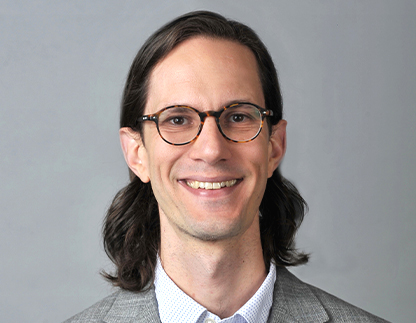At the heart of my work is a core belief in the transformative power of music education.”
David DeAngelis
PhD Candidate in Music Education

David DeAngelis is a PhD candidate in Music Education in the Bienen School of Music, where he is a fellow in the Center for the Study of Education and the Musical Experience. His research focuses on exploring issues of diversity, equity, and inclusion within music education, especially for K-12 music teachers.
How would you describe your research and/or work to a non-academic audience?
At the heart of my work is a core belief in the transformative power of music education, which has led me to focus on making music education as accessible and equitable as possible. For my dissertation, I am exploring the issues of diversity among music educators by examining the collegiate experiences of music teachers of color at three key moments—graduation, deciding to leave a program, and planning where to work. I also have early-stage studies underway that explore music teaching and learning in different contexts, including at charter schools and for incarcerated youth.
What have been some of the most memorable twists and turns of your career?
I think the biggest twist of my career was probably the time I spent working at Google. Coming out of undergrad, Google was supposed to be my "career," but I deferred my offer to instead do Teach for America in rural Arkansas for two years. When that finished, I moved to California to start my career at Google, but I soon realized that I really missed teaching music and was looking for opportunities to make the move back into education. So, after a couple years at Google spent working in support and sales for small business advertisers, I left when I had the opportunity to become the founding music teacher at KIPP SF College Prep, a new charter school that was just about to open in San Francisco.
How do you unwind after a long day?
I'm not sure if it's actually unwinding, but I play in a local indie-rock band called Zorila. My favorite things to do with the group are write and record new music. Not only does it provide a creative outlet for my own music-making, but it’s super fun to play live shows at venues across the city of Chicago. We have a new album coming this fall/winter (depending on how fast we work in the studio!).
What inspires you?
My daughter. She's two-and-a-half, and the days we spend together are mostly spent doing a variety of musical activities. (I can't help being a music teacher around her!) Watching the joy with which she approaches making music with me at home is a constant reminder that music is a core part of the human experience. And it's FUN! Sometimes, I’m afraid that we as music educators—and music education researchers—may lose sight of the fun that music-making should be, and so my daughter really helps me keep this in perspective.
Tell us about a current achievement or something you're working on that excites you.
Something that excites me is the work I’m currently doing with AMPED, a hip-hop music composition program through Northwestern’s Center for Civic Engagement. I’ve been a graduate adviser for the program for the last few years, but last spring was the first time I was able to go do in-person programming at the Cook County Juvenile Temporary Detention Center. What makes this program powerful and unique is the chance for undergraduate student volunteers to build and develop relationships with residents at the detention center through a collaborative songwriting and production process. I’m looking forward to recruiting and training the next cohort of NU volunteers!
What are you most proud of in your career to date?
I am most proud of the six years I spent at KIPP SF College Prep, where I designed the music program to reduce barriers that often exist for students to access music education. Through a lot of fundraising and by building partnerships with local organizations, I supplemented my annual budget to provide all instruments and equipment at no cost to students. I also structured the program so that students needed no previous experience to enroll in music classes. In my time there, we were frequent performers at parades and other events in the Bay Area, and we even traveled to perform at festivals in Seattle and San Diego!
Publish Date: November 7, 2023
If you know a graduate student, postdoctoral fellow, graduate faculty member, staff member, or a member of our TGS alumni population who would make a great candidate for our TGS Spotlight Series, please complete this brief TGS Spotlight Series Nomination Form.